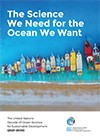Monitoring the Ocean
We depend on the ocean for our well-being, yet its importance is not matched by our knowledge. The formulation of sustainable, ecosystem-based policies and measures for oceans and coasts needs to be supported by science including research and observations. Monitoring efforts are especially crucial at a time when the world’s ocean, coasts and marine ecosystems are undergoing great changes caused by increasing greenhouse gases, coastal pollution, overfishing, coastal development or increasing population pressure.
UNESCO's Intergovernmental Oceanographic Commission (IOC-UNESCO) manages the Global Ocean Observing System to provide a coordinated approach to deployment of observation technologies, rapid and universal dissemination of data flows and delivery of marine information to inform and aid marine management and decision makers and to increase the appreciation of the general public of our changeable ocean.
The Joint WMO-IOC Technical Commission for Oceanography and Marine Meteorology (JCOMM) is an intergovernmental body of technical experts that provides a mechanism for international coordination of oceanographic and marine meteorological systems. JCOMM provides observing capabilities, data management, and services that combine the expertise, technology and capacity building capabilities of the meteorological and oceanographic communities.
The International Oceanographic Data and Information Exchange programme (IODE) enhances theses programmes by facilitating the exploitation, development, and exchange of oceanographic data and information among participating Member States. The IODE works to narrow the “digital divide” by training marine information specialists and improving data system capacity in developing states, with an emphasis on Africa









